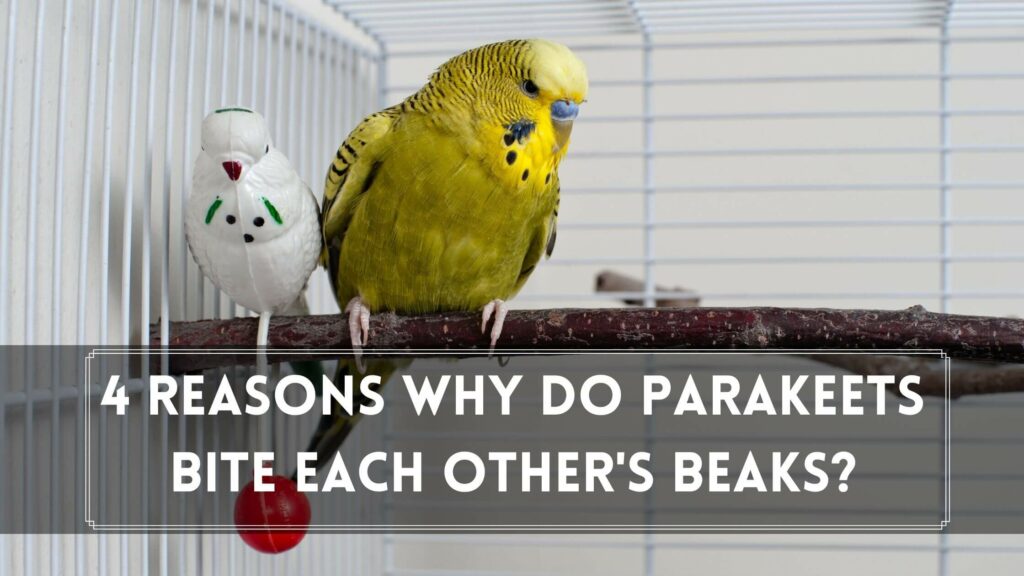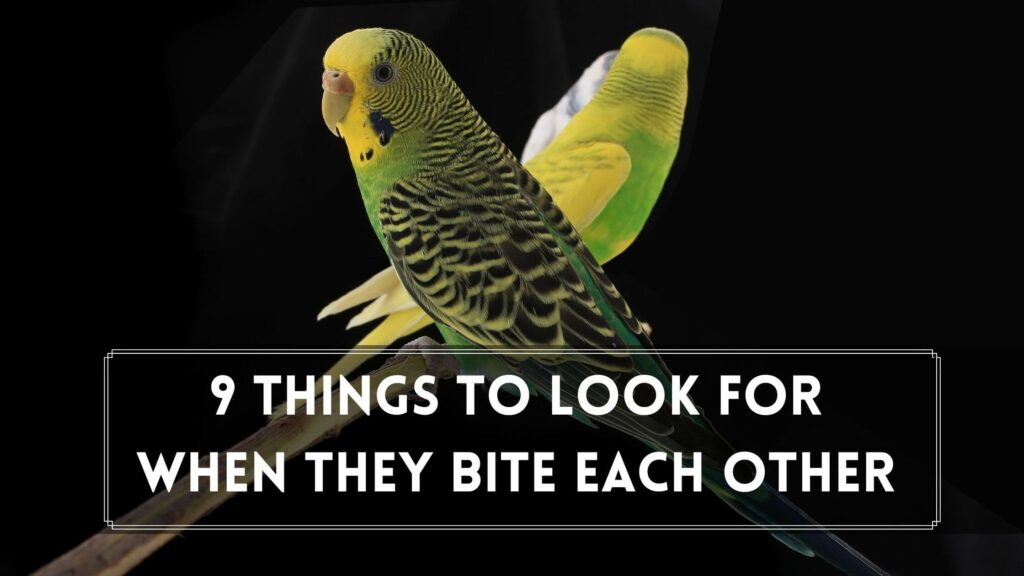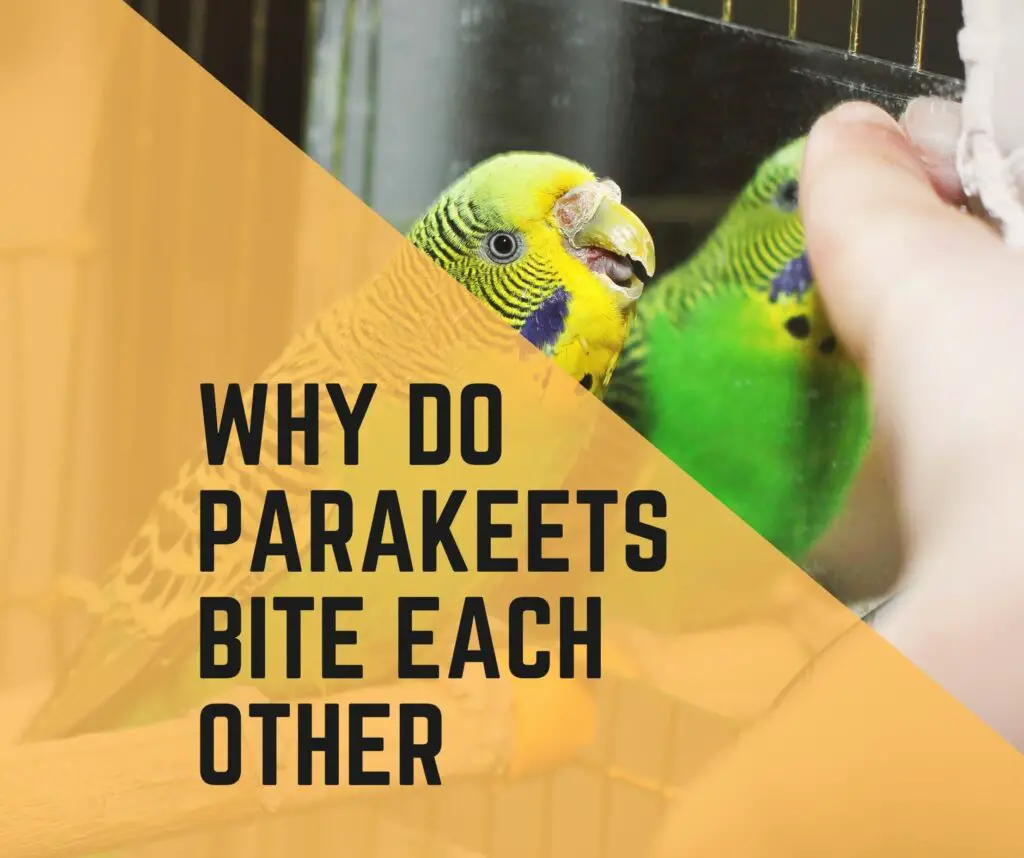For many years, they were biting has been seen as a natural behavior for various pet birds and wild birds. Parakeets employ their biting skills to transmit multiple messages to birds and human beings.
When Parakeets are biting each other, it is not a reason to panic. In this article, I’m going to detail all the reasons Why Do Parakeets Bite Each Other?. It is essential to address this before the behavior continues for a long time and one Parakeet is injured by the other.
4 Reasons Why Do Parakeets Bite Each Other’s beaks?

Here are my best at least four main reasons why parakeets attack each of their beaks.
Mating behavior.
During mating, parakeets can be seen biting each other, mainly when their hormones are at their peak. The time of mating for different bird species differs significantly, but the mating season for parakeets generally occurs during spring.
Be aware of the kind of Parakeet you own and know the most they can on mating behavior so that you can address the behavior of biting as swiftly as you can and biting behavior when mating is acceptable.
In addition, if two males are fighting for a female’s attention, it is best to be sure to separate them. Males are more likely to fight and bite one other over the attention of their spouses. When males mating, Parakeets frequently bite females.
Your Parakeet is juvenile and is exploring.
The majority of times, we forget that young birds like to make use of their beaks to discover the world around them and taste different food items. It is possible to think of this behavior as the teething stage that young mammals traverse.
If you’ve got a juvenile or a pair of young parakeets who are gnashing at each other, likely, they’re just trying to test the world and the environment around them and their companion.
Parakeets in their early years frequently bite one another to play, express their displeasure exploring, or even fight.
Your dominant parakeet behavior.
Male Parakeets are highly territorial. If there are multiple birds within their territory, it is possible to anticipate them fighting. A single Parakeet may bite to establish dominance over the other.
To establish authority, your bird could bite and fight at one another. Additionally, the behavior can persist as they interact during their daytime lives.
If you think your Parakeets fight over area or resource, make sure your Parakeet with less power can access water, food, toys, and enough space for living.
If you observe one of the birds fighting with the other over food treats, toys, or other desirable items within the habitat, fighting will likely escalate.
A dominant Parakeet isn’t in a position to frighten the dominant bird and you are unable to, you may need to split them up to permit the bird to drink or take a bite.
The Parakeet is not happy.
In the world of birds, it has been discovered that when birds feel anger or discontent, the birds bite one another. If your parakeets are constantly biting each other, she is likely angry or upset. A parakeet that is scared may grind its companion’s beak.
Therefore, there’s an excellent chance that the unhappy bird may have upset your bird by some means. It could be as simple as a Parakeet playing with a toy or food item that another one would like.
Furthermore, biting could indicate that your Parakeets personality is not communicating well, and they aren’t getting each other.
- Interesting Further Reading
- Can Parakeets Tolerate Heat? If So, How Much?
- All About Parakeets Making Noise & Sounds
- Can Parakeets Live Alone? + Do Parakeets Need a Companion
- All About: Parakeets Breeding Behaviour!
Why Do Parakeets Bite Each Other’s tail?
Five essential reasons why parakeets bite each Other tails.
- Parakeets generally have distinct personality traits and, if one Parakeet is cage-sharing with another, likely, their personalities aren’t working well together and interacting well.
- If you’re new to owning a parakeet or bird breeder, you’re comparing preening to the aggressive behavior with the fact that it is only. Many Parakeets will attack each other’s tails to groom themselves as well.
- A few Parakeets tend to join together to have a blast because they find it funny and enjoyable.
- The reason behind this could be different; however, a parakeet may argue with his cagemate over any issue that turns into a heated debate that results in the smacking of feet or feathers and biting each other.
- Although parakeets are social birds, They can be insecure or possessive at any moment. This means that your bird could bite each Other tails for fun or even to claim territory.
If you notice your parakeet alone or are determined to find the cause, it is worth keeping track of their behavior frequently. If you’ve noticed that your pet’s feet are getting bitten, you might be wondering why. Let’s discuss it.
Why Do Parakeets Bite Each Other’s feet?
If you see your parakeets biting one another’s feet, it could be a sign of grooming just. This alone may be a sign of any behavioral or health problems in your Parakeets.
Parakeets can also bite each other’s feet when they experience itchy and dry skin. If your bird suffers from arthritis, mites, Bumblefoot, or vitamin A deficiency, this behavior may be observed.
Parakeets are known to bite their own feet or other feet to relax or get rid of tension. Parakeets can also chew the other’s feet to relieve boredom.
In addition, they have been observed biting their partners’ nails when they are too long to cut them shorter.
Nails that are too long can be problematic for Parakeets because they cannot climb or walk correctly. The negative emotions of Pet birds can lead to repetitive self-mutilation. Is this a problem? Let’s discuss this.
Is this Concerning?
It is based on why they are biting others and the specific circumstances. You or only your vet will be able to pinpoint the reason your parents fight and bite one the other.
According to the general rule for thumbs, if parakeet bird doesn’t appear to be frightened or apprehensive about beatings or feathers don’t appear to be bent violently or twisted, then they’re simply teasing one another.
It’s also commonplace in parakeets younger than six months. If you see your birds picking the feathers of their rivals or chewing on it with brutality, It’s likely to be something to do with dominance.
The vulnerable Parakeet is often seen in a secluded area to keep from being further away from the dominant.
If you notice this type of behavior, or your Parakeet appears to be harassing the other, you should break them up before one of your pets is seriously injured.
But, to determine whether they must be separated or if all is in order, there are nine signs of looking for when fighting against one another.
9 Things to look for when they bite Each Other

- What is the size of your pet’s cage?
In a small cage, the birds may fight when one of the birds isn’t getting its freedom to fly or room for resting. If this happens, or in a cage with a small size, one can expect a parakeet to become cranky and ready to smack any bird that gets upset. This is why a larger cage is recommended for breeding and keeping parakeets.
2. How strong are the pulling and biting?
In most cases, bites and tugging at the tails of one another can be an act of playful play in the feathers of your parrot. If you notice your Parakeet’s feathers not bent or damaged in any way, there’s nothing to worry about.
However, if the feather of your bird gets tangled up violently, then it’s bullying. Separate your two birds without delay.
3. Are all your birds getting enough toys and perches?
All parakeets and similar-sized birds require mentally and physically stimulating at all times. If there’s a finite quantity of toys and perches available, your birdies could quickly become bored. The boredom of parakeets can cause them to draw each other’s feathers or tails for entertainment.
4. Are there new birds inside the cage?
If you introduce a new parakeet to an already existing one, you risk becoming bullies. If you discover that the bullied bird is the most recent member of your bird’s family, it is best to keep them apart for the moment. It is possible to reintroduce them later, but for the moment, any frequent bullying may cause one of your birds to be seriously injured.
5. Are your birds sick?
The majority of birds can detect a sick bird in the group. When one or more of your birds has a disease, then the majority of uninfected birds could be trying to evict the affected bird to minimize the chance of contracting.
6. Are there breeding opportunities for parakeets?
In the spring months, Parakeets experience hormonal changes because of being in the season of breeding. When breeding season is in full swing, female parakeets are more aggressive than males and battle over the minor syllables of irritation.
Maybe one of your parakeets is ready to reproduce, while another one is constantly rejecting his request repeatedly. This can make the one left angry or make the other and result in physical attacks.
7. Is your Parakeet stressed?
Stressed parakeets can even mutilate their bodies. It is not surprising when a parrot strikes another bird due to stress, and it is essential to identify the cause of stress and alleviate it. Parakeets’ leading causes of anxiety stem from loneliness, familiarity with the environment, noisy sounds, sleep irregularities, and nutritional deficiencies.
8. Are there enough water and food containers to be found inside the cage?
If you own more significant than two pairs of parakeets and one container of clean water, Your bird will frequently engage in battle with other birds. Because parakeets identify their territory, a lack of resources can be a source of irritation for them.
9. Are the bites limited to tail feathers?
The act of shoving another parakeet to the ground, usually by slapping the tail feathers, is not uncommon and is often seen.
If one bird is just poking at another’s feathers or a tail feather and the person who is nipping isn’t being frightened or expressing concern, it is not something to be concerned about.
Most of the time, birds do not object to the issue if it’s just irritation from pinfeathers and mold.

Hi, There and Welcome to BirdsNews.com, is here to help you learn and care about pet birds. and this blog is a journal of everything I’ve learned.

